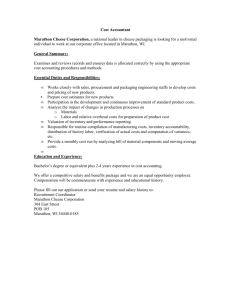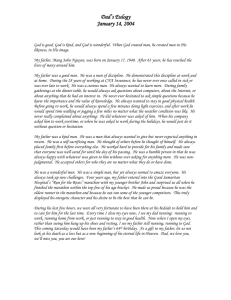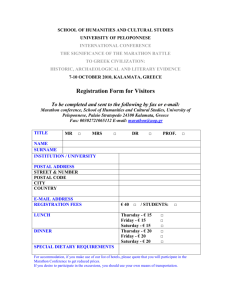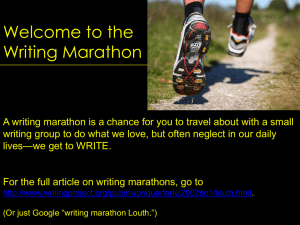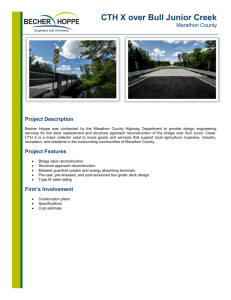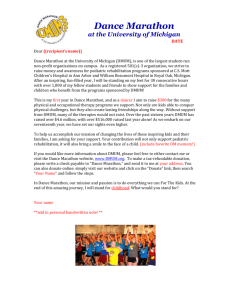The Guldensporen Marathon, Kortreijk – Bruges, Belgium
advertisement
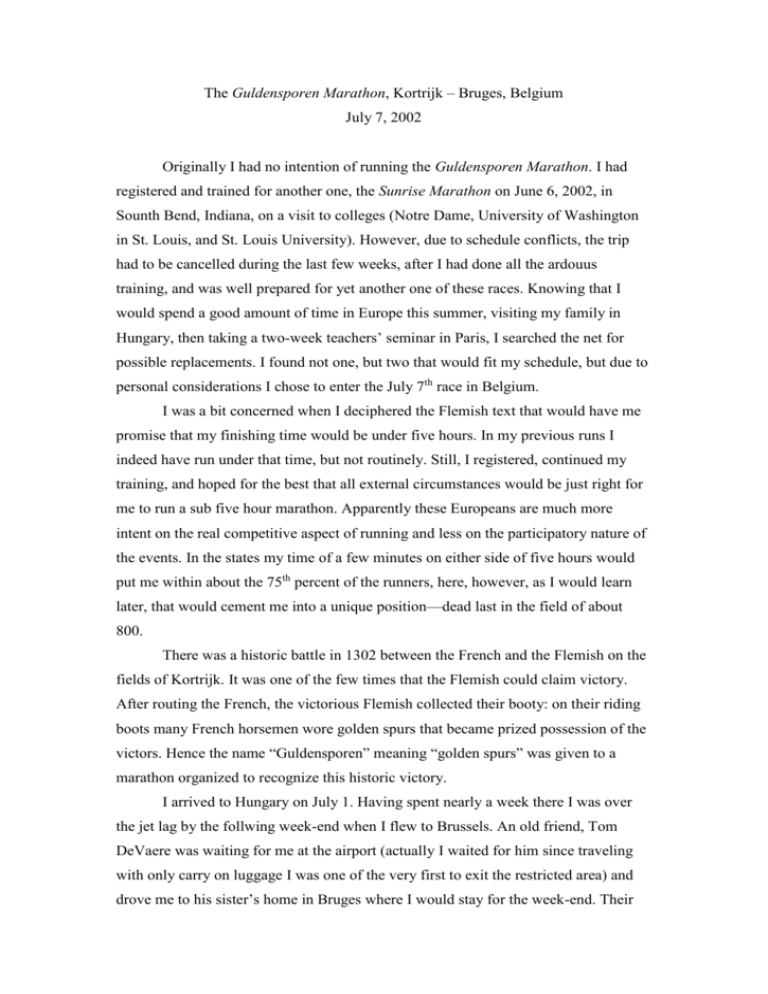
The Guldensporen Marathon, Kortrijk – Bruges, Belgium July 7, 2002 Originally I had no intention of running the Guldensporen Marathon. I had registered and trained for another one, the Sunrise Marathon on June 6, 2002, in Sounth Bend, Indiana, on a visit to colleges (Notre Dame, University of Washington in St. Louis, and St. Louis University). However, due to schedule conflicts, the trip had to be cancelled during the last few weeks, after I had done all the ardouus training, and was well prepared for yet another one of these races. Knowing that I would spend a good amount of time in Europe this summer, visiting my family in Hungary, then taking a two-week teachers’ seminar in Paris, I searched the net for possible replacements. I found not one, but two that would fit my schedule, but due to personal considerations I chose to enter the July 7th race in Belgium. I was a bit concerned when I deciphered the Flemish text that would have me promise that my finishing time would be under five hours. In my previous runs I indeed have run under that time, but not routinely. Still, I registered, continued my training, and hoped for the best that all external circumstances would be just right for me to run a sub five hour marathon. Apparently these Europeans are much more intent on the real competitive aspect of running and less on the participatory nature of the events. In the states my time of a few minutes on either side of five hours would put me within about the 75th percent of the runners, here, however, as I would learn later, that would cement me into a unique position—dead last in the field of about 800. There was a historic battle in 1302 between the French and the Flemish on the fields of Kortrijk. It was one of the few times that the Flemish could claim victory. After routing the French, the victorious Flemish collected their booty: on their riding boots many French horsemen wore golden spurs that became prized possession of the victors. Hence the name “Guldensporen” meaning “golden spurs” was given to a marathon organized to recognize this historic victory. I arrived to Hungary on July 1. Having spent nearly a week there I was over the jet lag by the follwing week-end when I flew to Brussels. An old friend, Tom DeVaere was waiting for me at the airport (actually I waited for him since traveling with only carry on luggage I was one of the very first to exit the restricted area) and drove me to his sister’s home in Bruges where I would stay for the week-end. Their house was practically next to the route the marathon would take as it finished on the main square. We had one full day before the race that we would spend with friendly visiting, good eating, and getting ready for the Sunday competition. Saturday morning Tom came over and we went shopping. It was imperative that I get some sports drink, for I knew that I had to be hydrated properly in order to avoid the very painful cramps that have plagued me during the last few marathons. I found some Gatorade (and also some exquisite Belgian Trappist beer) and tanked up for the occasion. We also went by the organizer’s office to pick up my packet. It was a slim one, with only my number and a map detailing the course. I pinned my #220 on my Cross Country Club of Dallas singlet and began to psych myself up for the following day. I retired early, by 9 p.m., had a fairly restful night, and woke up without an alarm at 5:00 a.m. the next day. I pretty much expected that. I went down to the living room where Hannelore and Frederik (her husband) have prepared coffee for me. With that in my system I started my hydration then waited for the time to pass. The day before I walked to the bus stop from where we would be driven to Kortrijk and knew that it would take exactly 12 minutes to walk. I left in plenty of time and did arrive to the location well before the 6:30 departure time. The temperature was ideal, something like 50 degrees, with an expected high not to reach 70. The buses showed up, we boarded them, made small talk with the other participants. I hoped that the bus would leave on time so that we would get to Kortrijk soon enough. That was not to happen. We waited for quite a while, and I of course ran into the problem that normally plagued me (the need to go the bathroom) from about half-way through. It got so bad that I asked the busdriver to stop for me on the way. Fortunately he obliged, so I jumped off the bus, and in plain view of everyone, I relieved myself. They applauded when I reboarded the bus; they all knew what it was all about, since this is a fairly common problem. We arrived to the location where they set up a large gym for our comfort. People started to come and mill around, warm up and talk. A fellow from South Africa approached me and asked a few questions, then stareted to to talk about some of his past runs. With a great deal of enthuasiasm he told me about a favorite marathon of his, the Kaiser Plus Marathon that is run on September 29th. He told me that it is run in a beautiful city that has many bridges, and is very well organized— Budapest—that I should try to run myself. At first I did not want to tell him that I know all about that city, but eventually I told him (by this time them, for several 2 others joined in the conversation) that I was born there and actually just flew in from and will be returning. Now they started to ask me about the city, whether I knew the language and if it was a slav language—all the typical questions that I have fielded many, many times before. It made a very pleasant wait. Shortly before 9 they asked us to move to the start line. There were, in my estimation about 900 of us, eager to depart. I brought my camera along, took a few pictures, and asked one of the people I met on the bus to take my own picture too. Promptly at 9 the gun went off and we were off, too. No matter how fast the rest began I trotted along at my regular pace (now I had to count in metric) about 6:30 minutes per kilometer. This corresponded to about my 10:30 or so pace based in miles. I had hoped to keep this all the way through. Nobody walked; so I did not either—for the first half. Pretty soon I was solidly anchored at my place, the last one, that I was to keep for practically the whole duration of the race. There was an ambulance bringing up the rear, and I could hear its diesel engine revving at a comfortable distance behind me. Periodically he would pass me, the driver would make eye-contact, ask me if I was doing OK, offer me refreshments, then move back behind me again. It was comforting to know that they cared for all of us. The route was fairly straight, going north toward Bruges. All along the way there were spectators, shouting encouraging words to the runners. I did not understand most of them since they were in Flemish, but periodically a French „allez, allez! Bien!” would also be heard. Except for one guy, who asked me if I got lost, they were all very encouraging and urged me on. It was a pretty normal marathon, with the first half (as the saying goes „a marathon is made up of two halves, the first 20 miles and the second 6”) going quite well, mechanically, enjoyable. My right groin started to cramp at about the 22 mile stretch, and I slowed down. Not much further a loudspeaker announced the runners’ names and also where they were from. Since I was at the end of one of my walking stretches, while they were urging me on I got back into my running stride; they went wild, thinking that it was their encouragement that gave me strength to trot again. There was something to it, but I would have started to run even without them shouting. It was about at this juncture that we crossed through some agricultural land. I normally don’t mind the typical farm smells, actually I can take the smell of cowmanure rather well, but these people had just spread fresh pig-manure on their land 3 and the stench was nearly unbearable. Had I eaten anything before the race I am sure I would have reencountered my breakfast on the way. Fortunately there arose a slight breeze from the rear that helped both to clear the stench and also help us along. I could already see the towers of Bruges, so I knew that the ordeal was close to end. With about 3 kilometers left Hannelore came to meet me on her bike. She rode right next to me all the way through. Not only she, but one of the ambulance folks too got out of the car and in his white outfit started to run along with me. He talked to me, asked me questions, and generally encouraged me to keep on. He also showed me the way as it meandered along the canals, across bridges and into the narrow streets. I paid close attention to the time, and with 200 meters left I was right at the limit. I wanted to speed up and sprint, but did not have any more gas left. I watched the clock go to the 5:00, then past it; to a thunderous applause (I think only the winner could have gotten more) I crossed the finish line at 5:00:42, as I said, dead last. A bit disappointing, but still OK. At the finish they apologized for not having a finisher’s medal and T-shirt for me. Apparently more people finished then they had anticipated. They promised that they would send them to me through the mail. I fully expect them to do so. With Hannelore at my side I walked very slowly home. I was very tired but happy. The expected calf cramps did show up as I started to climbs the steps to my room, but they subsided fairly quickly. I had a good night’s sleep, then got back on the plane the next morning and flew back to Budapest where I had to tell the story blow, by blow over and over to my family and friends. 4
